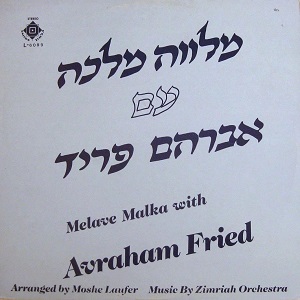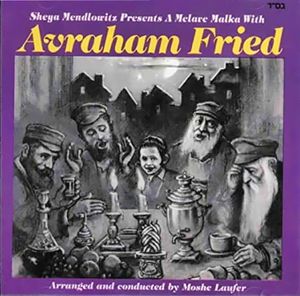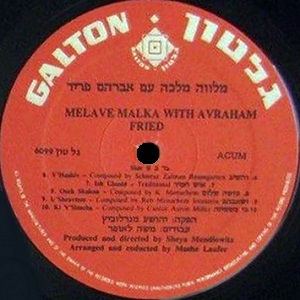Avraham Fried/Melave Malka: Difference between revisions
No edit summary Tag: 2017 source edit |
No edit summary Tag: 2017 source edit |
||
| Line 37: | Line 37: | ||
== Guest Appreciation In == | == Guest Appreciation In == | ||
* [[:Category:Song by lyricist/Yom Tov | * [[:Category:Song by lyricist/Yom Tov Ehrlich|Reb Yom Tov Ehrlich]] | ||
* Cantor Aaron Miller | * Cantor Aaron Miller | ||
* ? | * ? | ||
Revision as of 04:55, 26 February 2024
| Melave Malka with Avraham Fried | ||||
|---|---|---|---|---|
 Original vinyl sleeve | ||||
| Studio album by | ||||
| Released | 1984 | |||
| Genre | Chassidic | |||
| Length | 42:21 | |||
| Language | Yiddish, Hebrew, Aramaic | |||
| Label | ||||
| Producer | Sheya Mendlowitz | |||
| Full discography chronology | ||||
| ||||
| Original Hebrew vinyl cover | ||||
 | ||||
| Original CD cover | ||||
 | ||||
| Hebrew CD cover | ||||
 | ||||
Melave Malka (a.k.a. Melave Malka with Avraham Fried) (Hebrew: מלווה מלכה עם אברהם פריד[Notes 1]) is the fourth studio album by Chassidic singer Avraham Fried, released in 1984 by Holyland Records.
The album features ten songs in Yiddish, Hebrew and Aramaic. The songs are composed by multiple composers, and not one main composer as in previous releases.
Album is currently distributed in North America by Aderet Records, and in Israel by Gal-Paz.
Featured songs
Side A
- Askeinu[Notes 2] • אתקינו
- Hamavdil • המבדיל
- Simon Tov[Notes 3] • סימן טוב
- A Good Week • א גוטע וואך
- Yivarechicha[Notes 4] • יברכך ה' מציון

Side B
- V'Haishiv[Notes 5] • והשיב
- Ish Chosid • איש חסיד היה
- Oseh Shalom • עושה שלום
- U'Sheavtem[Notes 6] • ושאבתם
- Ki V'Simcha[Notes 7] • כי בשמחה
Credits
- Produced and directed by Sheya Mendlowitz
- Arranged and conducted by Moshe Laufer
- Music: Zimriah Orchestra
- Recorded in (...?) N.J.
- Empowered by Joe & (Nanci?) Marciano
Guest Appreciation In
- Reb Yom Tov Ehrlich
- Cantor Aaron Miller
- ?
- Rabbi Eli Teitlebaum(?)
- Mendy Werdyger
- ?
- Zvi Pill
Notes
- ↑ Gal-Paz later renamed the album to "מלוה מלכה".
- ↑ In later releases, it is spelled "Askinu Seudoso".
- ↑ In later releases, it is spelled "Siman Tov".
- ↑ In later releases, it is spelled "Yivarechecha".
- ↑ In later releases, it is spelled "Veheishiv".
- ↑ In later releases, it is spelled "Usheavtem Mayim".
- ↑ In later releases, it is spelled "Ki Vesimcha".
Categories:
- Album by singer/Avraham Fried
- Album year/1984
- Album by genre/Chassidic
- Album by label/Holyland Records
- Album by label/Aderet Records
- Album by label/Gal-Paz
- Album by label/Galton
- Album by language/Yiddish
- Album by language/English
- Album by language/Aramaic
- Album by occasion/Motzei Shabbat
- Album by producer/Sheya Mendlowitz
- Album by musical ensemble/Zimriah Orchestra
- Album by arranger/Moshe Laufer
- Album by conductor/Moshe Laufer
- Album